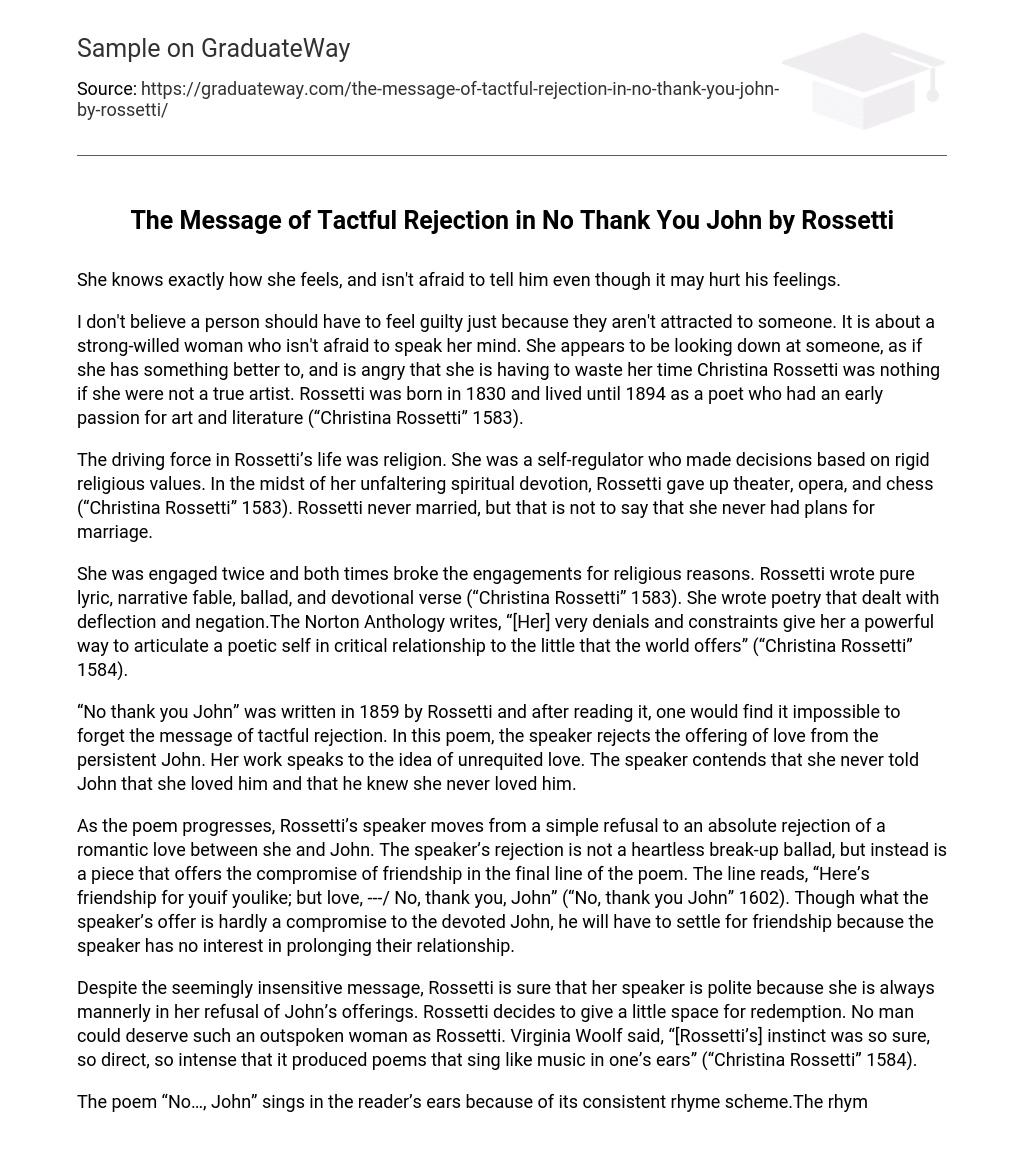She knows exactly how she feels, and isn’t afraid to tell him even though it may hurt his feelings.
I don’t believe a person should have to feel guilty just because they aren’t attracted to someone. It is about a strong-willed woman who isn’t afraid to speak her mind. She appears to be looking down at someone, as if she has something better to, and is angry that she is having to waste her time Christina Rossetti was nothing if she were not a true artist. Rossetti was born in 1830 and lived until 1894 as a poet who had an early passion for art and literature (“Christina Rossetti” 1583).
The driving force in Rossetti’s life was religion. She was a self-regulator who made decisions based on rigid religious values. In the midst of her unfaltering spiritual devotion, Rossetti gave up theater, opera, and chess (“Christina Rossetti” 1583). Rossetti never married, but that is not to say that she never had plans for marriage.
She was engaged twice and both times broke the engagements for religious reasons. Rossetti wrote pure lyric, narrative fable, ballad, and devotional verse (“Christina Rossetti” 1583). She wrote poetry that dealt with deflection and negation.The Norton Anthology writes, “[Her] very denials and constraints give her a powerful way to articulate a poetic self in critical relationship to the little that the world offers” (“Christina Rossetti” 1584).
“No thank you John” was written in 1859 by Rossetti and after reading it, one would find it impossible to forget the message of tactful rejection. In this poem, the speaker rejects the offering of love from the persistent John. Her work speaks to the idea of unrequited love. The speaker contends that she never told John that she loved him and that he knew she never loved him.
As the poem progresses, Rossetti’s speaker moves from a simple refusal to an absolute rejection of a romantic love between she and John. The speaker’s rejection is not a heartless break-up ballad, but instead is a piece that offers the compromise of friendship in the final line of the poem. The line reads, “Here’s friendship for youif youlike; but love, —/ No, thank you, John” (“No, thank you John” 1602). Though what the speaker’s offer is hardly a compromise to the devoted John, he will have to settle for friendship because the speaker has no interest in prolonging their relationship.
Despite the seemingly insensitive message, Rossetti is sure that her speaker is polite because she is always mannerly in her refusal of John’s offerings. Rossetti decides to give a little space for redemption. No man could deserve such an outspoken woman as Rossetti. Virginia Woolf said, “[Rossetti’s] instinct was so sure, so direct, so intense that it produced poems that sing like music in one’s ears” (“Christina Rossetti” 1584).
The poem “No…, John” sings in the reader’s ears because of its consistent rhyme scheme.The rhyme scheme alternates a b a b c d c d creating a rhythmic rejection song to John. The first and third lines of the poem rhyme with the thirtieth and thirty-second lines of the poem. The effect of the rhyming is to bring a conclusion to the situation.
The lines bring a balanced end to the poem. Rossetti’s speaker rejects John from the beginning of the piece to the conclusion of the work. As consistent as the rejection in the poem, is Rossetti’s use of conversation. The poem appears as though John is attempting a rebuttal against the speaker as she is trying to put him out for the final time.
As he fights her on the subject she refutes his argument in the following lines (13-16): I have no heart? —Perhaps I have not; But then you’re mad to take offenceThat I don’t give you what I have not got: Use your common sense (“No,.. John” 1601). Though John refuses to take “no” for an answer, Rossetti’s speaker refuses to offer “yes” an answer.
She counters every time he tries to make her rethink her decision. Ultimately, all of John’s attempts to salvage some sort of love with the speaker are in vain.





